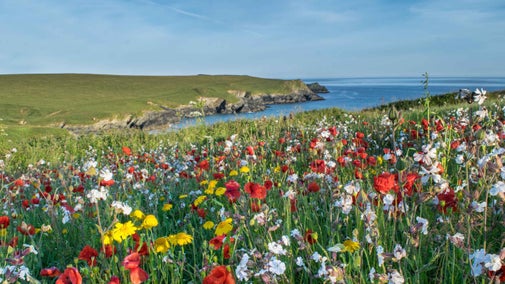
Discover more at Holywell
Find out how to get to Holywell, where to park, the things to see and do and more.

The Kelseys and Cubert Common can be found on the North Cornwall Coast. Discover more about these two areas.
The South West Coast Path hugs the coast with footpaths criss-crossing the headland. Beyond Kelsey Head you'll find Porth Joke and then West Pentire.
Cattle and sheep can graze on the common and headland throughout the year. Please look out for signs with information about grazing animals that might be on the footpath ahead, particularly if you're out walking with a dog.

Please keep dogs on leads 1 March-31 July to protect ground nesting birds such as skylarks.
The Kelseys consist of three enclosures called Inner, Middle and Outer Kelseys, separated by ancient walls. They were of sufficient importance to be shown on the first edition one-inch Ordnance Survey map (c1809) - fields are not usually represented.
The inner walls are of considerable height and built like the corn ditches of Dartmoor – a near vertical wall on one side and a gently sloping bank on the other. Worked flints and potsherds of an older era were found in the late 1940s in this general area, but no scientific excavation has been carried out.
The Kelseys are cropped for part of the year with hay and corn, and cattle are grazed after the harvest until ploughing begins. Grazing of exposed cliff pastures has stopped in many parts of Cornwall, but at the Kelseys this traditional form of agriculture continues. Cattle sometimes come down onto Porth Joke beach to drink from the stream flowing across the sand, and to shelter from the wind.
At Kelsey Head itself a low bank and shallow ditch of a cliff castle can be seen. Off shore is an islet called the Chick, and seals may be spotted from the cliffs. Fulmars nest on the tiny ledges.
Cubert Common is an undulating area of sandy grassland popular amongst horse riders. It is one of the few enclosed commons in England. Sand blown from the dunes at Holywell has created a lime-rich tilth. A fine Bronze Age barrow (burial mound) stands on the southern side of the common.

Find out how to get to Holywell, where to park, the things to see and do and more.
Holywell is a two pawprint rated place. Holywell is a great place for a walk with your dog. Take a look at these top tips to make the most of your visit.

Find out about the coastal wild flowers growing at West Pentire.

Discover plenty of opportunity to spot flora and wildlife in every season on this varied walk along the National Trust's coastline near Newquay.

Explore an easy 1-mile trail at the National Trust's Cubert Common in Cornwall and discover a wealth of nature and wildlife across open grassland. Look out for wildflowers and skylarks with sounds of the ocean to accompany you on this walk.

Holywell is the largest bay on this stretch of coast. From enjoying a peaceful walk to surfing on the beach, there is plenty to explore.
